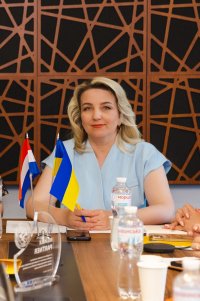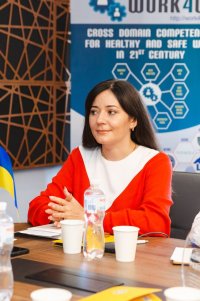Round table: ‘Psychosocial support for veterans: European experience and Ukrainian perspectives’
 At the initiative of Oksana Koval, Director of the Education and Research Centre for Communications, a roundtable discussion was held at the West Ukrainian National University on the current issues of psychosocial support for veterans and police officers returning to civilian life after participating in combat operations.
At the initiative of Oksana Koval, Director of the Education and Research Centre for Communications, a roundtable discussion was held at the West Ukrainian National University on the current issues of psychosocial support for veterans and police officers returning to civilian life after participating in combat operations.
The event was organised as part of the visit of a delegation from the Global Resilience Centre (Eduquest, the Netherlands) and aimed at sharing European experience, finding effective solutions for Ukraine and developing international cooperation.
One of the key topics of discussion was how the police balance their participation in combat operations with their law enforcement duties. Many police officers who have taken part in combat operations subsequently return to service in the rear, which puts additional pressure on them and the system as a whole. It is important to understand whether Ukraine has effective support programmes for such veteran police officers, including for their adaptation, psychological recovery and burnout prevention.
Special attention was paid to discussing the challenges that law enforcement officers face in working with veterans. Are police officers sufficiently prepared to communicate with people who have had traumatic experiences? What conflicts or misunderstandings arise most often? It is also important to analyse what psychological difficulties police officers themselves often experience after working in extreme conditions - whether it be anxiety, depression, PTSD or other consequences of chronic stress.
The group also discussed how to improve the support system. What tools should be introduced to increase its effectiveness? Can international experience, including European practices of psychosocial support, be adapted to improve the situation in Ukraine? Finding answers to these questions will help to create a more sustainable and humane support system for those who defend the country on the front line and in civilian life.
Oksana Shandruk, Director of the Educational and Research Centre for Social and Psychological Support and Resilience; Nataliia Yablonska, Director of the Student Support Centre, Associate Professor of the Department of Information and Socio-Cultural Activities; Mariia Brygadyr, Chief Specialist of the Educational and Research Centre for Communications, Associate Professor of the Department of Psychology and Social Work, shared their experience and ideas for implementing psychosocial support programmes for veterans.
Such discussions are an important step towards creating a modern system of support for those who defend Ukraine at the frontline and in civilian life.















